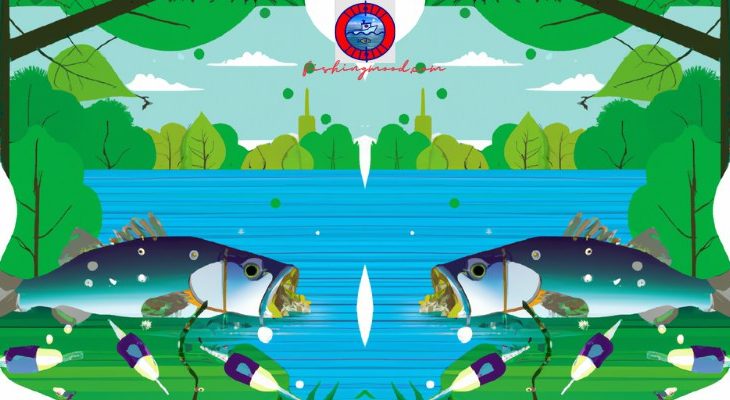Last updated on February 13th, 2024 at 10:43 am
Last updated on February 13th, 2024
Freshwater fishing is a popular recreational activity that involves catching fish in freshwater bodies such as rivers, lakes, and ponds.
Whether you are a seasoned angler or a beginner, mastering the art of freshwater fishing requires understanding the basics of gear, techniques, preparation, strategies, and conservation and ethics.
In this article, we will provide a comprehensive guide to help you get started with freshwater fishing and become an expert in no time.
Equipment
The right gear is essential for successful freshwater fishing. The basic gear required for freshwater fishing includes rods, reels, lines, hooks, and lures. When choosing a rod, consider the type of fish you are targeting and the technique you plan to use.
Reels come in different types, such as spinning reels and baitcasting reels, and selecting the right one depends on your fishing style.
Lines and hooks come in various sizes and materials, and the choice depends on the type of fish you are after and the conditions in which you are fishing.
Lures are used to imitate the natural prey of fish and come in different colors, shapes, and sizes.
It is also important to maintain your gear properly to ensure its longevity and performance.
Clean your gear after each use and store it in a dry place. Regularly inspect your lines and hooks for any damage, and replace them as needed.
Techniques
Freshwater fishing techniques vary depending on the type of fish you are targeting and the location. Some popular freshwater fishing techniques include casting, trolling, and jigging.
Casting involves casting your line and waiting for a fish to bite. Trolling involves dragging your bait or lure behind a boat to attract fish. Jigging involves using a jig, which is a weighted lure, to imitate the swimming motion of a baitfish.
When selecting a fishing technique, consider the type of fish you are targeting, the location, and the conditions.
For example, trolling is effective for catching deep-water fish, while casting is ideal for catching fish in shallow water.
Understanding the basics of each technique and how to perform it correctly is essential for successful freshwater fishing.
Preparation
Preparation is key to a successful freshwater fishing trip. Before heading out, research the fishing location to determine the type of fish present and the best fishing spots.
Obtain any necessary licenses or permits and make sure you are familiar with the rules and regulations of the fishing location. Choose the right bait and lures based on the type of fish you are targeting.
To find the best fishing spot, it is important to understand how to read water. Look for areas where fish are likely to be hiding, such as near underwater structures, drop-offs, and weed beds.
Predicting the behavior of fish is also important, as it can help you choose the right fishing spot and technique.
When packing for your fishing trip, make sure you have all the necessary gear, including extra hooks, lures, and line. Organize your gear in a way that makes it easy to access and prevents tangles.
Fishing Strategies
Different types of fish require different fishing strategies. For example, bass are best caught using topwater lures, while catfish are caught using baits such as worms and cut bait. Trout are caught using artificial lures or live bait. Panfish, such as bluegill and crappie, are best caught using small jigs and minnows.
It is important to choose the right bait and lures based on the type of fish you are targeting and the conditions. For example, using bright-colored lures on a sunny day can be more effective than using dark–colored lures. Pay attention to the weather conditions and the time of day, as these can also impact the behavior of fish.
Another important aspect of fishing strategy is patience. Fishing is a waiting game, and it is important to be patient and wait for the right moment to set the hook. Pay attention to your line and watch for any movements or changes in tension, as these can indicate a fish is biting.
Finally, it is important to adjust your fishing strategies as needed. If you are not having success with one technique or lure, try something different. Pay attention to what is working and what is not, and make changes as needed to improve your chances of catching fish.
Conservation and Ethics
Conservation and ethics are important in freshwater fishing. It is important to practice catch-and-release to ensure the sustainability of the fish populations and to maintain the balance of the ecosystem. When releasing fish, handle them carefully to reduce stress and minimize injury.
Additionally, it is important to follow fishing regulations and laws, such as size limits, daily catch limits, and fishing seasons. These regulations are put in place to protect fish populations and maintain the ecological balance of the waterways.
Glossary of Freshwater Fishing Terms
In order to master the art of freshwater fishing, it is important to understand some of the terminology used in the sport. Here is a list of some common terms used in freshwater fishing:
Lure: An object used to attract fish, typically made of metal, plastic, or feathers
Line: The thin, strong material used to connect the fishing rod to the hook and lure
Reel: The device used to wind and store fishing line
Rod: The long, flexible tool used to cast the line and hook
Hook: A small, sharp object used to catch fish
Bait: A substance used to entice fish to bite, such as worms or insects
Strike: The action of setting the hook when a fish bites
Catch-and-release: A practice of releasing fish back into the water after catching them, in order to promote conservation and maintain fish populations
Backing: A thin layer of line used to fill the spool of the reel, providing extra support for the main fishing line
Leader: A short length of line attached to the end of the main fishing line, used to provide a clear connection to the hook and lure.
By familiarizing yourself with these terms and the equipment used in freshwater fishing, you can better understand the sport and improve your chances of success on the water.
Freshwater fishing can be a fun and rewarding activity for people of all ages and experience levels. Whether you are a beginner or a seasoned angler, by following the tips and techniques outlined in this article, you can master the art of freshwater fishing and have a successful fishing trip every time.
So grab your gear, head to your favorite fishing spot, and enjoy the peaceful, calming surroundings while you wait for the next big catch.
Freshwater Fishing FAQs
What type of gear do I need for freshwater fishing?
A fishing rod, reel, line, hooks, lures, bait, and tackle box are the basic gear needed for freshwater fishing.
What are the different freshwater fishing techniques?
Some common freshwater fishing techniques include spinning, baitcasting, jigging, and fly fishing.
How can I prepare for a freshwater fishing trip?
To prepare for a freshwater fishing trip, it is important to check weather conditions, obtain a fishing license if necessary, and research the types of fish in the body of water you will be fishing.
What are some effective fishing strategies for different types of fish?
Some effective fishing strategies for different types of fish include using the right gear, lures, and techniques for the specific fish species and adjusting your strategies based on the weather and time of day.
Why is conservation and ethics important in freshwater fishing?
Conservation and ethics are important in freshwater fishing because they ensure the sustainability of fish populations and maintain the balance of the ecosystem. It is important to practice catch-and-release and follow fishing regulations and laws.
How can I become an expert in freshwater fishing?
To become an expert in freshwater fishing, it is important to familiarize yourself with gear, techniques, preparation, strategies, and conservation and ethics. Reading articles and books, attending fishing clinics and workshops, and getting hands-on experience on the water can also help you improve your skills.
Conclusion
Mastering the art of freshwater fishing requires understanding the basics of gear, techniques, preparation, strategies, and conservation and ethics.
By following the tips and guidelines outlined in this article, you can improve your chances of having a successful fishing trip and become an expert in freshwater fishing. Good luck and tight lines!
References for Freshwater Fishing Techniques and Tips Outline:
Freshwater Fishing Basics, Reel Fishing
How to Start Freshwater Fishing, Outdoor Empire
Essential Freshwater Fishing Tips for Beginners, World Fishing Network
Glossary of Freshwater Fishing Terms, Take Me Fishing
Freshwater Fishing Techniques: Spinning, Baitcasting, Jigging, and Fly Fishing, World Fishing Network
Preparing for a Freshwater Fishing Trip, Take Me Fishing
Conservation and Ethics in Freshwater Fishing, Take Me Fishing
Expert Tips for Mastering Freshwater Fishing, Outdoor Empire



